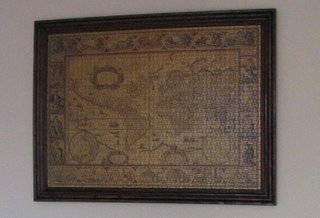Standard stuff on the big day: turkey, ham, sausage stuffing, mashed potatoes, plus bourbon creamed corn, white cheddar scalloped squash, and cheddar rolls. The wife found a great recipe for turkey and ham Cuban sandwiches on ciabatta bread for Friday night, and on Saturday we made pita bread pizzas so the kids could participate.
Through it all the children watched movies and ran around screaming in anger and joy, adults drank bloody marys, wine, and Irish whiskey while playing dominoes, and everyone had a grand time. None of it was stressful--indeed Terrie and I finished just about every little project we had planned before everyone arrived, including refinishing some old kitchen chairs so they matched the table and touching up the paint around the house. We also completed a 2000 piece old-style gold world map puzzle and I made a frame for it out of molding. It is now hanging it what will be the library.

The library. Sigh. The library, now some 2,300 volumes worth, is still mostly in boxes, even as we approach a year in our new home. The reason is that we are building the shelves, and building the shelves means that we have to go to a friend's house in Topeka to have the right tools, and going to a friend's house in Topeka requires having planning and motivation, and having planning and motivation will eternally be a shortcoming of this particular diarist. That said, the process has begun: wood has been bought for the first three shelves, said wood has been cut, and now the pieces must together be put--hopefully in the next week. On it goes.
What I'm reading. Based in large part on my friend JD's recommendation, I just finished reading Gerhard Weinberg's excellent Visions of Victory: The Hopes of Eight World War II Leaders. I won't get into the details of the book, but I found one part of the section on Franklin Roosevelt especially interesting. Weinberg is first a historian of Germany, and so he brings a slightly different perspective to the vision and policies of FDR for the war. This paragraph, from pages 203-204, stood out:
There were, however, critical differences in Roosevelt's view of Japan and his view of Germany. He registered the dissimilarity between and German public that had turned to National Socialism and had become increasingly enthusiastic about it, on the one hand, and the series of coups, assassinations, and provoked incidents be which the militarists had shot their way to power in Japan, on the other. While Japan, therefore, was to lose all imperial acquisitions gained since its war with China in 1894-95, there is not the slightest indication that Roosevelt ever contemplated for Japan the sort of territorial amputations imposed on Germany--at least to a considerable extent with his approval. Similarly, Roosevelt at no time considered dividing Japan into several separate states, a strategy very much part of his thinking about the future of Germany. The literature that attributes all manner of racist sentiments to American leadership in World War II has conveniently and consistently ignored the fundamentally positive view of Japan held by Roosevelt and his advisors as compared with their perspective on Germany.Roosevelt probably underestimated the extent to which the Japanese people bought into the militarists' program--see, for one small example, Brian Daizen Victoria, Zen at War--but that's the point, isn't it? He gave the Japanese people the benefit of the doubt, and gave the supposedly superior Germans nothing.
Of course the folks who see racism as the driving force will say that FDR looked at the Japanese people as mindless sheep who could more easily be driven than the intelligent Germans who chose to embrace Nazism. Because everything had a racist motive. Because they'll never be satisfied that racism was but one factor in fighting the Pacific war, and on the American side nowhere near the most important one.
What else I'm reading. Looking for some first-rate fiction, and inspired by the folks in Topeka with all the tools, I'm now reading C.S. Forester's Horatio Hornblower saga. Hornblower, as most know because of the television series, was Master and Commander long before Russell Crowe put on Jack Aubrey's stockings.
The Hornblower books--which I'm reading in order of the sailor's career, not the order of publication (maybe a mistake, like watching episodes 1-3 before 4-6 or reading The Magician's Nephew before The Lion, The Witch, and The Wardrobe)--are fascinating and exciting and well-worth the effort. I've just finished the three books that make up Captain Horatio Hornblower, and at the end of the third book, Flying Colours, Hornblower has become a national hero for his exploits against Napoleonic France, and he is not too happy about it.
Forester writes:
Prospect, and not possession, was what gave pleasure, and his cross-grainedness would deprive him, now that he had made that discovery, even of the pleasure of prospect.A common lesson, but put well.
Now back to work--completed books and bookshelves beckon. Happy prospects, those.
1 comment:
Same one, with the same yummy sausages. An excellent accidental find.
Post a Comment